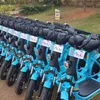[Weekly News Roundup] From India’s first lithium-ion fabrication workshop to plummeting sales
Here’s a quick power-packed wrap-up of all the important things which happened in the Indian automotive industry.
The automotive industry continues to be in turmoil due to the ongoing economic slowdown in the country. With the market set migrate to BS-VI emission norms, manufacturers are gearing up with the final tweaks before the inevitable.
Also, manufacturers are reeling with supply constraints due to the impact of coronavirus scare not just in China, but the world over.
Here’s what made headlines this week.
Vehicle sales continue to be in red in February 2020

As per data released by the Society of Indian Automobile Manufacturers (SIAM), passenger vehicle sales dropped by 7.6 percent to 251,516 units this month as compared to 272,243 units in February 2019. Two-wheeler sales faced a bigger fall of nearly 20 percent with volumes in February 2020 dropping to 1,294,791 units, as against 1,614,941 units in the same month last year.
Commercial vehicle sales declined to 58,670 units sold, witnessing a drop of 32.90 percent. Also, the three-wheeler sales dropped by over 31 percent to 41,300 units last month.
SIAM expects that volumes may continue to be impacted further in March 2020 due to the supply constraints from China. The auto industry body added that disruption in the availability of parts is likely to critically hamper production across all segments.
Ralco enters expansion mode for existing facility

In an exclusive interaction with AutoStory, Yogeshwar Sharma, Vice President of Ralson India (Ralco’s parent company), confirmed that the tyre maker will be nearly doubling its installed capacity of 2.81 million units per annum to five million units by the end of July 2020. The company at present has two plants in Ludhiana (Punjab).
Diversifying to new segments, Ralco will be entering the lucrative truck and bus radial tyre business. At present, it is constructing a new state-of-the-art greenfield facility in Indore (Madhya Pradesh), which will be spread over 200 acres and will see an investment of Rs 2,000 crore in four phases.
It is working on the construction work on a war-footing and expects the first product to roll out from the assembly line within two and a half years.
Aishwarya Pissay aims to compete at Dakar in the next three years

In a tête-à-tête with AutoStory, Aishwarya Pissay, who became the first Indian to win a world title in motorsports last year, by clinching the FIM Baja World Cup in women’s category, said that she wants to compete at Dakar within the next three years.
She wants to head back to the FIM Baja World Cup this year to defend her title.
Bajaj Dominar 250 launched

After focussing on the upgradation of Bajaj Pulsar range to meet the new BS-VI emission norms, the Pune based manufacturer has launched the new Dominar 250. The quarter-litre motorcycle is priced at Rs 1.60 lakh (ex-showroom, Delhi), which makes the sports tourer Rs 30,000 more affordable than the Dominar 400. The motorcycle gets thinner 37 mm upside-down front fork and a smaller front disc. Also, it gets thinner profile tyres than its bigger sibling.
At the heart of the Bajaj Dominar 250 is a 248.77cc single-cylinder DOHC mill, which dishes out 27 PS of power and 23.5 Nm of torque. Other features include LED headlamp, slipper clutch, and reverse backlit instrumentation.
Ola Electric receives $1 million from Hero MotoCorp’s Pawan Munjal

Pawan Munjal, Chairman and Managing Director of Hero MotoCorp, joins the list of bigwigs betting big on Ola Electric. He has invested around $1 million in his personal capacity via Pawan Munjal Trust.
The Bhavesh Aggarwal led startup has previously received funding from SoftBank and Tata Sons Chairman Emeritus Ratan Tata. South Korean carmakers Hyundai and Kia Motors too have backed Ola Electric.
Pawan Munjal, via Hero MotoCorp, has previously also backed the Ather Energy, a Bengaluru based electric scooter making startup. Founded in 2017, Ola Electric aims to have bring one million electric vehicles on Indian roads by 2022.
MG Motor selects Indian startup Driftly Electric for its developer programme

British carmaker MG Motor has selected Driftly Electric as the first startup for its Developer Programme and Grant initiative. The startup’s app helps electric vehicle owners find the nearest charging point. Besides, the application also includes charging infrastructure set up by private individuals which Driftly users can use for a certain charge.
Driftly will be using the grant to further expand its services through a peer-based ecosystem approach. MG Motor aims to further shortlist more startups in the future as part of this initiative.
Hyundai commences bookings for the 2020 Verna

The 2020 Hyundai Verna can now be booked online or at dealerships of the carmaker for a deposit of Rs 25,000. The company has offered the sedan with a sportier design language. It is shod with new bumpers, new LED headlamp, and new dual-tone alloy wheels.
Features include remote engine start/stop, remote climate control, remote door lock/unlock, an eight-inch infotainment system, and voice-activated commands. Powertrain options will include the same 1.5-litre petrol and 1.5-litre diesel from the new Creta and the 1.0-litre turbocharged petrol from the Venue.
India’s first lithium-ion fabrication workshop conducted in Pune

A workshop was recently concluded in Pune by the India Energy Storage Alliance (IESA) and the Centre for Materials for Electronics Technology (C-MET). This first of its kind workshop in India, it included both lab and classroom sessions on pouch cell fabrication and battery testing.
The sessions helped participants learn about the latest technology trends and to understand the fundamentals of cell manufacturing. Ten participants from companies working on battery manufacturing, automotive component manufacturing, and ESS (energy storage system) technology, participated in the workshop. Besides, it also included presentations on cell manufacturing, chemistries and performance characteristics, and next-generation lithium-ion technologies.
Initiatives like these have previously been conducted in Germany and the United States and will help Indian companies reduce their operating costs but also help the industry get a better appreciation of the R&D facilities available within India.
(Edited by Saheli Sen Gupta)


![[Weekly News Roundup] From India’s first lithium-ion fabrication workshop to plummeting sales](https://images.yourstory.com/cs/54/9aed5fa0c8be11e9a36aeb06ee850db6/Image5ro0-1584259250748.jpg?mode=crop&crop=faces&ar=2%3A1&format=auto&w=1920&q=75)












